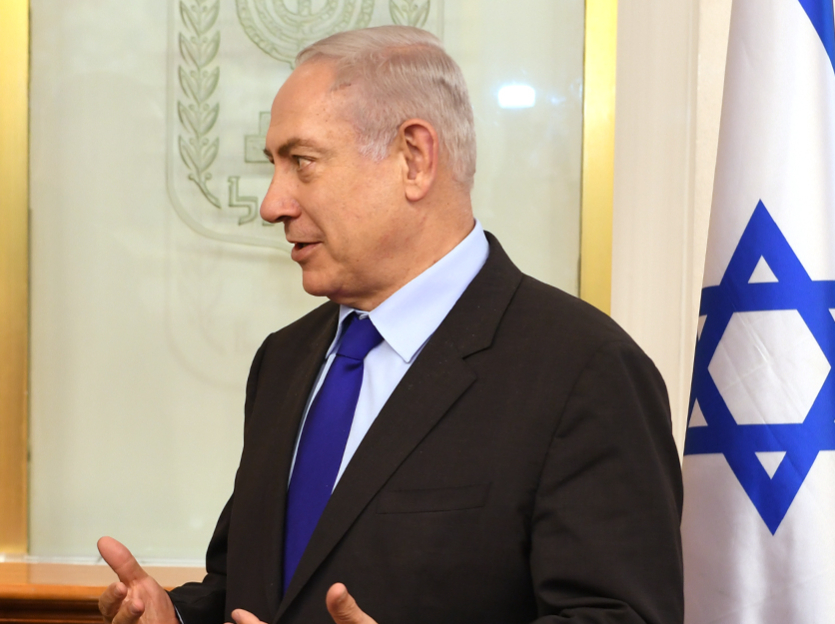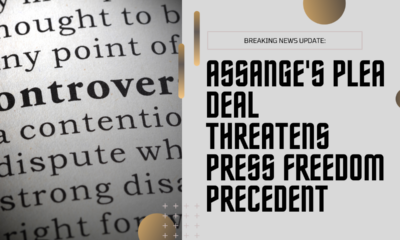Civilization
How Netanyahu Can Convince Israelis, Reassure US, and Satisfy Saudis

Early last week, almost seven months after Iran-backed Hamas jihadists perpetrated heinous war crimes in Israel – murdering, raping, mutilating, and kidnapping mostly civilians – the Israel Defense Forces (IDF) seized the Philadelphi Corridor, a narrow stretch of Gaza’s Rafah district on the border with Egypt. Prime Minister Benjamin Netanyahu’s government believes that a ground operation in Rafah will enable Israel to accomplish its principal war aims: destroy Hamas’ ability to rule Gaza and to wage war against the Jewish state while putting pressure on the terrorists to release some 130 abductees – mostly civilians, a few Americans among them – whom Hamas holds hostage in gross violation of the international laws of war.
Netanyahu has no plan for the day after the war
Entering Rafah has intensified Israel’s most pressing diplomatic challenge, which involves maintaining close relations with the United States, Israel’s best friend and essential partner, and upgrading relations with Saudi Arabia, the largest and richest Gulf Sunni Arab monarchy. Hamas’ unlawful conversion of Gaza’s cities into battlefields and its illegal use of Palestinian noncombatants as human shields have already brought about immense loss of life and massive damage to buildings and neighborhoods as Israel has pursued its legitimate war aims. Both the United States and Saudi Arabia oppose a major Israeli ground operation in Rafah for fear of additional civilian casualties and destruction of civilian infrastructure. Both the United States and Saudi Arabia, moreover, have called on Israel to support the creation of a Palestinian state, which Israel has declined to do. Reassuring the United States and satisfying the Saudis will demand from Netanyahu responsible diplomacy of a high order.
Responsible diplomacy encompasses a plan for the day after Israel attains its principal war aims. This Netanyahu has failed to provide. The best available explanation for his refusal to clarify Israel’s intentions is the pressure from his hard-right flank, led by Finance Minister Bezalel Smotrich and National Security Minister Itamar Ben-Gvir. At any suggestion of Palestinian self-rule in Gaza, they threaten to bring down Netanyahu’s government. Yet a suggestion may be all that Netanyahu needs to thread the diplomatic needle amid Israel’s seven-front war with the Islamic Republic of Iran and its regional proxies.
Gaza is only one front
War on those seven fronts – Gaza, Judea and Samaria, Lebanon, Syria, Iraq, Yemen, and Iran itself – is unlikely to end anytime soon. While the IDF has substantially degraded Hamas’ ability to wage war and rule Gaza, Jerusalem cannot achieve the “absolute victory” Netanyahu has repeatedly promised. Hamas is too integrated into Gazan society and too entwined with Palestinian hearts and minds. But by maintaining ultimate security control over Gaza for the short and intermediate term, Israel can greatly reduce the threat that Hamas poses.
Gaza, though, is just one front in Iran’s war on the Jewish state. Israel operates daily to counter Hamas in Judea and Samaria. In addition, Israel has inflicted painful blows on Hezbollah in the low-intensity aerial war launched by the Iran-backed military in southern Lebanon shortly after Hamas’ Oct. 7 attacks, but some 80,000 Israelis remain unable to return to their homes in the north because of constant drone and rocket attacks as well as fear of a surprise ground invasion by Hezbollah’s Radwan forces positioned close to the border. Notwithstanding Israel’s early-April killing in Damascus of several senior commanders of Iran’s Islamic Revolutionary Guard Corps, Syria remains a transit point for weapons heading from Tehran to Lebanon. Despite Israel’s remarkable air-defense capabilities – second to no military in the world – Iranian proxy forces in Iraq and Yemen possess drones and missiles that target Israel.
Israel needs friends
To meet this array of perils, Israel needs friends and partners. None is more important to Israel than the United States.
According to the Council on Foreign Relations, “Israel has long been the leading recipient of U.S. foreign aid … and has privileged access to the most advanced U.S. military platforms and technologies.” Not least, America supplies the backbone of Israel’s air force – F15s, F16s, and F35s – along with the spare parts that are essential to the upkeep of these high-tech combat-aircraft marvels. In addition, since the Oct. 7 attacks, the United States has maintained an “extraordinary flow of aid” that “has included tank and artillery ammunition, bombs, rockets, and small arms.” It is hard to see how Israel can accomplish its long-term military objectives without this equipment.
Consequently, the Biden administration’s decision in early May to delay the delivery of some 3500 bombs to Israel and the president’s statement in a May 8 CNN interview that he will withhold weapons if Israel proceeds with an attack on Hamas’ stronghold in Rafah represent shots across the bow. They also send the atrocious message to Israel, other friends and partners and, not least, Hamas and other adversaries, that the jihadists’ fiendish use of Palestinian civilians as human shields works.
Saudi Arabia and the Abraham Accords
Saudi Arabia, too, plays a key role in Israeli diplomacy. The 2020 Trump administration-brokered Abraham Accords, which normalized relations between Israel and the United Arab Emirates and Israel and Bahrain, would not have been signed had the Saudis objected. Since 2023 and with increasing openness, the Saudis have expressed interest in normalizing relations with Israel, too. Like the UAE and Bahrain, Saudi Arabia sees vital opportunities to cooperate with Israel in countering their common adversary Iran and expects substantial benefits from commerce and trade with the Jewish state.
Saudi normalization, however, comes with a price. Crown Prince and Prime Minister Mohammed bin Salman has made clear that normalization would require the United States to sell more advanced weapons to the Saudis, cooperate in the creation of a Saudi civil-nuclear program, and enter a formal defensive alliance with the kingdom. In addition, Riyadh insists – as does the United States – that Israel show progress in promoting the establishment of a Palestinian state.
The Biden administration has indicated its willingness to meet Saudi requirements. Israel has not.
Netanyahu has little room to maneuver
Although he emphasized his determination to normalize relations with Saudi Arabia after regaining the prime ministership in Nov. 2022, Netanyahu has little room to maneuver. In the current circumstances, his base and more than a few members of the opposition view calls for the prompt recognition of a Palestinian state as rewarding horrific terrorism. They are persuaded, moreover, that owing to the Palestinian Authority’s notorious corruption and weakness, a PA-governed state would swiftly fall into Hamas’ hands and promptly become another forward Iranian base on Israel’s border. Meanwhile, elements of the hard right led by Smotrich and Ben-Gvir seem determined to renew Israeli settlements in Gaza – in 2005, Prime Minister Ariel Sharon’s government withdrew all soldiers and civilians from there – among the strip’s 2.3 million Palestinians.
The question for Netanyahu is how to meet Saudi Arabia’s and the United States’ minimum requirements concerning a Palestinian state while honoring his base’s aversion to the idea and his hard-right coalition partners’ threats of mutiny at the prospect.
Conditions Palestinians would never accept (though anyone else would)
Netanyahu’s groundbreaking 2009 Bar Ilan Speech provides the model. Fifteen years ago, under pressure from President Barack Obama, Netanyahu became Israel’s first prime minister to endorse a Palestinian state. But he stressed two crucial conditions: The Palestinians would need to recognize Israel as the nation-state of the Jewish people, and the state would have to be demilitarized.
These conditions were reasonable. They were also unacceptable, Netanyahu knew, to the Palestinians. Affirming the two-state principle while bringing into focus the realities that thwarted its realization enabled Netanyahu to placate the Obama administration while assuaging his base and retaining his governing coalition.
The issue resurfaced in 2015. While campaigning for reelection, members of Netanyahu’s Likud Party declared that “a demilitarized Palestinian state that would recognize the Jewish state” had been made irrelevant by Middle East realities. Netanyahu offered a more nuanced assessment. His office issued a statement explaining that “Prime Minister Netanyahu has made clear for years that given the current conditions in the Middle East, any territory that is given will be seized by the radical Islam just like what happened in Gaza and in southern Lebanon.”
That security assessment holds true today. Furthermore, Palestinian leadership is again highly unlikely to formally recognize Israel as the nation-state of the Jewish people and accept a demilitarized state.
Reaffirm the same conditions and put the onus on the enemy
That means that Netanyahu could thread the diplomatic needle in 2024 as he did in 2009. By reaffirming the same principles, he could reassure the United States and satisfy the Saudis. By insisting on the same reasonable conditions, he would highlight the obstacles on the Palestinian side to the principles’ short-term implementation, which may convince his base and coalition partners to go along.
This will strike many as cynical and manipulative. To the contrary, affirming a long-term goal while illuminating the circumstances that prevent its near-term achievement is an essential part of responsible diplomacy. It would also open the door to near-term and intermediate-term steps that will enable Israel – once it destroys Hamas’ capacity to wage war and govern and secures the hostages’ release – to provide for its national security while incrementally increasing Palestinian self-rule.
This article was originally published by RealClearPolitics and made available via RealClearWire.
Peter Berkowitz is the Tad and Dianne Taube senior fellow at the Hoover Institution, Stanford University. From 2019 to 2021, he served as director of the Policy Planning Staff at the U.S. State Department.
-

 Executive4 days ago
Executive4 days agoSecret Service chief gets no solace
-

 Executive3 days ago
Executive3 days agoWaste of the Day: Louisville Taxpayers Pay Nearly $600,000 For Empty Building’s Maintenance, Security
-

 Guest Columns5 days ago
Guest Columns5 days agoFear Itself: Democrats’ Favorite Strategy Caused Their Current Chaos
-

 Executive3 days ago
Executive3 days agoWhere is Joe Biden – or Jill?
-

 Executive2 days ago
Executive2 days agoWaste of the Day: Throwback Thursday: Cities Used Crime Prevention Funds on Soccer Games, Paper Shredding
-

 Executive2 days ago
Executive2 days agoFacile and politically motivated suggestions
-

 Civilization5 days ago
Civilization5 days agoBuild Iron Dome in the United States To Prepare for Israel’s Worst Day
-

 Executive2 days ago
Executive2 days agoBiden makes farewell whisper










